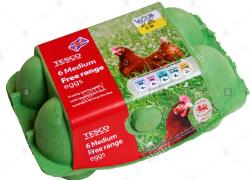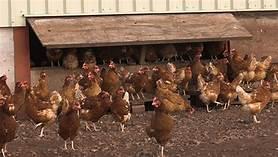 John Kirkpatrick, a senior manager responsible for sourcing agricultural products for Tesco, a major U.K. grocery chain, speaking at an industry meeting confirmed that his company will market three tiers of eggs. Organic will represent the highest level, free-range the core, and barn eggs will represent the entry level.
John Kirkpatrick, a senior manager responsible for sourcing agricultural products for Tesco, a major U.K. grocery chain, speaking at an industry meeting confirmed that his company will market three tiers of eggs. Organic will represent the highest level, free-range the core, and barn eggs will represent the entry level.
When the EU implemented the ban on conventional cage housing commencing in 2012, many producers converted to colony modules. Since the substantial investment was made by egg producers, the market was moved to non-confinement systems making eggs from colony cages apparently undesirable. Barn eggs, including floor systems and aviaries, represent the most economic approach to satisfying the restrictions imposed by the major chains that appear to be “out-welfaring” themselves in a competitive market. Consumers however appear to have been excluded from the exercise and have been deprived of the opportunity to purchase eggs of their choice at a price they can afford.
 It is evident that in the U.S. a high proportion of consumers still favor low-priced eggs and in a recessionary environment, it is more than probable that by the 2025 deadline at least 30 percent, and perhaps more, of our 220 million hens producing shell eggs will remain in either enrichable cages or enriched modules. The pace of conversion to aviary and floor systems has slowed considerably, especially with the collapse of the food service sector. COVID restrictions resulted in closure of restaurants and diversion of shell eggs from the food service sector to the retail shell market. Due to the slow recovery of the food service sector as many universities and schools remain closed, availability of cash to invest in conversions has dried up and banks are understandably reluctant to extend loan capital to egg producers.
It is evident that in the U.S. a high proportion of consumers still favor low-priced eggs and in a recessionary environment, it is more than probable that by the 2025 deadline at least 30 percent, and perhaps more, of our 220 million hens producing shell eggs will remain in either enrichable cages or enriched modules. The pace of conversion to aviary and floor systems has slowed considerably, especially with the collapse of the food service sector. COVID restrictions resulted in closure of restaurants and diversion of shell eggs from the food service sector to the retail shell market. Due to the slow recovery of the food service sector as many universities and schools remain closed, availability of cash to invest in conversions has dried up and banks are understandably reluctant to extend loan capital to egg producers.
Consumers must be allowed a choice in their purchases of eggs. Currently it is estimated that one in six children is hungry and could benefit from thee nutritional value of eggs. Neither legislators, activists or grocery chains have the right to impose a ‘welfare tax’ on those who are least capable of feeding their families.